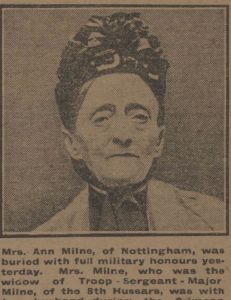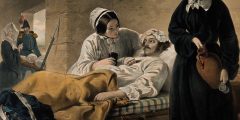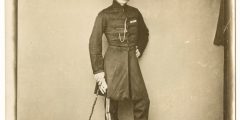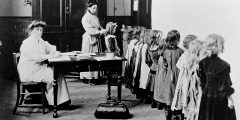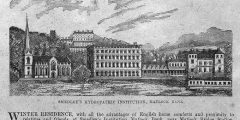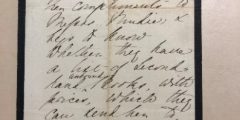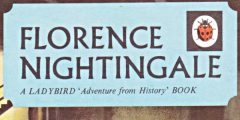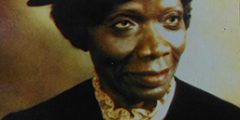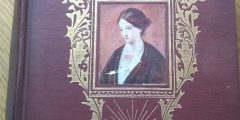Ann Milne – A Nottingham Army Wife who Nursed in the Crimean War
September 1, 2020
Our latest guest post comes from David Stewart OBE, a former head teacher and champion of the Nottingham arts scene and local history. This post discusses the Crimean War experience of Ann Milne, an army wife from Nottingham. Along with previous posts by Darcie Mawby on nurses and Sarah Topliss on Dr Edward Wrench, it …
Nursing Lives in the Crimean War
May 7, 2020
This post comes courtesy of Darcie Mawby, a second year PhD student at the University of Nottingham working on gender, conflict and identity in women’s accounts of the Crimean War, c. 1854–56. It is based on recent research conducted at the National Archives in Kew. [Crimean War. Women nurses tending wounded soldiers as “woman’s mission”. …
Edward Wrench: An Army Doctor in the Crimean War
This blog post is by Sarah Topliss, a volunteer citizen researcher who has in recent months been investigating the Wrench archive held by the University of Nottingham’s Manuscripts and Special Collections. The archive contains some 32 boxes of letters describing Wrench’s life in the Crimean War, Indian Rebellion, and work for the Duke of Devonshire …
Where was Florence Nightingale?: Developing Municipal Health Visiting After 1900
This piece by Dr Pamela Dale, honorary fellow at the University of Exeter, looks at the development of health visiting at a municipal level after 1900. This blog is drawn from Pamela’s ongoing research – if you have information that could help her, do get in touch! [Image: Woman Sanitary Inspector examining young girls’ hair, …
Parallel Paths in History: Florence Nightingale and John Smedley Jr
This guest piece is written by Steven Schmidt, a volunteer history researcher with the John Smedley Archive Charitable Trust. [Image: John Smedley’s Hydropathic Institute, Matlock Bank, Derbyshire, c. 1872. Wellcome Collection.] The central Derbyshire parish of Dethick, Lea, and Holloway is located on the eastern side of the Derwent Valley. Relatively thinly populated today, it …
Finding Florence Nightingale Across the Atlantic – by Steph Meek
October 1, 2019
Steph Meek, an AHRC-funded PhD Researcher at the Universities of Exeter and Reading, recently discovered two previously unknown letters by Florence Nightingale during a research visit to the University of Illinois at Urbana-Champaign. In the post below Steph explains how the letters shed light on the Victorian lending libraries to which Nightingale subscribed on behalf …
In Pursuit of Nightingale – by Katharine McMahon
July 3, 2019
Katharine McMahon is the latest guest contributor to our blog. Katharine’s novel The Rose of Sebastopol follows a thwarted disciple of Nightingale, Rosa, through her trials in the Crimea. It was selected for the Richard & Judy Book Club in 2008 and went on to become an international bestseller. In this post, Katharine recalls her …
The First BME Nurse in the NHS – by Professor Lynn McDonald
May 16, 2019
In our latest guest blog, Professor Lynn McDonald, editor of the Collected Works of Florence Nightingale and co-founder of the Nightingale Society, outlines the little-known story of Kofoworola Abeni Pratt, the first black nurse to work in the NHS. Mrs “Rola” Pratt was an outstanding nursing leader. When the Windrush Empire arrived in the U.K. in …
Writing About Florence Nightingale: Annie Matheson’s 1913 Biography
March 19, 2019
Our second guest blog comes from Val Wood, a former nurse and nurse educator and supporter of a number of historical and heritage initiatives across Nottinghamshire. Val is chair of Nottingham Women’s History Group. Right: Cover of Matheson’s book, published 1913 by Thomas Nelson & Sons, London. Image courtesy of Rowena Edlin-White. Over fifty biographies …

